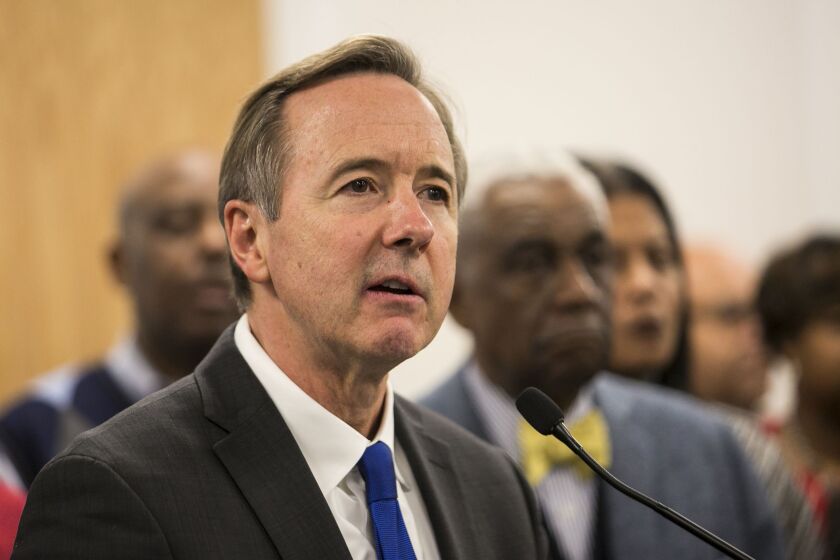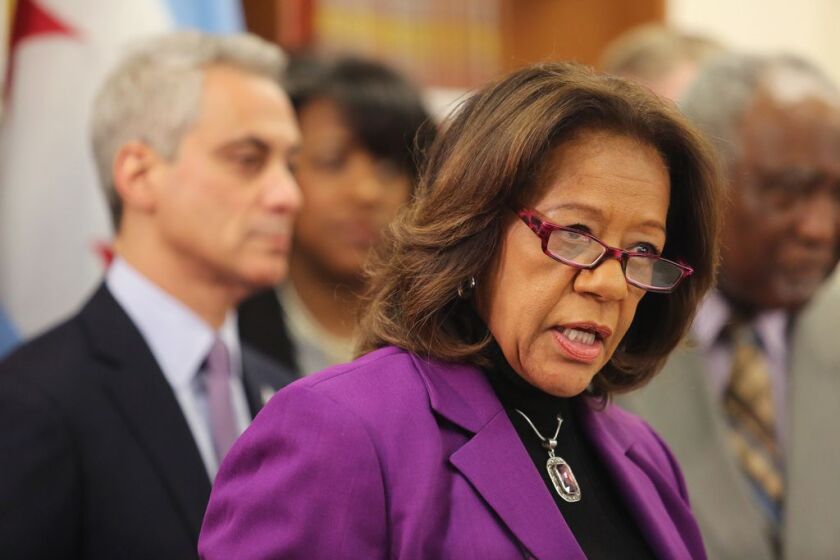Mayor Rahm Emanuel boasts of record high school graduation and college acceptance rates and improved test scores on his watch.
But the record Chicagoans most likely will remember from his tenure is that he closed 50 schools — more than ever had been closed at one time in the United States, most of them in African American neighborhoods.
And the closings were carried out by a Chicago Public Schools chief he picked, Barbara Byrd-Bennett, who later went to prison in a corruption scandal that was his administration’s biggest in eight years in office.
Emanuel’s greatest pride as mayor has been CPS’ improvement. During a recent speech at the City Club of Chicago, the mayor said education is “where I’ve tried the hardest and probably pushed the hardest.”
The improvements at CPS came “all because of the steps it took to get there” that Emanuel made sure were taken, City Hall spokeswoman Shannon Breymaier says.
Despite the stain of Byrd-Bennett’s imprisonment in a bribery scandal involving a CPS contractor and the ethics scandal that saw her successor, Emanuel’s longtime ally and friend Forrest Claypool, forced to step aside in 2017, the mayor gets credit not only for improvements in test scores and graduation and college-acceptance rates but also for extending classroom hours so Chicago no longer has the shortest school day in the country.
Among the programs he touts: Chicago’s first program to pay for community college for its high school graduates — the STAR Scholarships — and expansions of kindergarten to a full day and of free preschool for more families.
Yet the way Emanuel got his longer school day and year fed the flames that gave Chicago its first teachers’ strike in a generation.
CPS’ graduation rates, once the lowest among the country’s big cities, rose from 56.9% in 2010 to 78.2% in 2018. But those figures were found in 2014 to have been overstated and revised right after Emanuel won a second term in 2015 — and still to have left behind young African American men.
CPS’ finances have been stabilized tremendously, thanks in part to a new state funding formula Emanuel championed in Springfield. But one of the ways that Claypool, Emanuel’s schools CEO No. 4, balanced the books was by cutting special education services in violation of federal and state laws.
Stanford University research that Emanuel has frequently cited found remarkable growth in reading and math scores by CPS elementary students, who outpaced 96% of kids nationwide. But the data in that study went only up to 2014, before the worst of CPS’ budget crises brought deep cuts to school budgets two years in a row.
The closings — for reasons including academic quality and under-enrollment and a need to save money — didn’t improve academics for the kids in buildings that were closed or that took in students from those schools, University of Chicago research showed. Twelve of the closed school buildings remain empty and unused.
CPS continues to open schools and to authorize new charter schools. In September, an $85 million, open enrollment high school Emanuel wanted for Englewood will open.
But CPS has lost more than 40,000 students since 2010. And Emanuel’s proposed Obama College Prep high school, another selective enrollment school for the North Side, was cancelled after protests about equity in providing for students citywide.
Calmetta Coleman of the Urban League says, “We have some of the best schools in the nation, but not everybody actually has the opportunity to take advantage of those schools. Every student doesn’t have the benefit of getting that level of quality of education. And so I think that we can’t really, as a city, brag about our public education system until that opportunity is available to every child.”
When Emanuel exits City Hall May 20, he leaves the country’s third-largest school system in the hands of Janice Jackson, a respected CPS grad, parent and former principal who became his fifth schools chief.
“People will choose what they want to focus on,” says Robin Steans of Advance Illinois, which championed reform of the school funding formula. “Historic student successes, certain progress measures paints one picture, the strike, turnover level, the closings a very different picture.”
Emanuel inherited a host of messes from Mayor Richard M. Daley, whom Emanuel often referred to just as “my predecessor.” That included financial troubles at CPS from years of making reduced pension fund payments and enrollment that was falling as Chicago’s population and birthrates dropped, notably in African American neighborhoods.
The school system also saw students leave to go to privately managed charter schools.
Emanuel confronted the problems facing the schools, including improving CPS’ dire finances and instituting a host of measures in response to the Chicago Tribune uncovering hundreds of cases over a decade-long span of sexual abuse and assault against students.
“He’ll be remembered for the political courage, in my opinion, to make tough decisions that helped us to move the city forward,” including the closings, Jackson says. “And he has the scars from that.”
The outgoing mayor also deserves credit “for pushing forward a really aggressive agenda to try to fix some of these longstanding problems, like the shorter school day, like expanding pre-K, like doing some college work,” Andrew Broy of the Illinois Network of Charter Schools says. “And the real legacy, the way he should be remembered is as someone who superintended the district in a very challenging era to strong results.”
More CPS kids are getting into and going to college than did eight years ago. Graduation rates have improved thanks to emphasis on “freshman on-track” rates.
Emanuel also supported empowering principals were to make decisions for their individual schools, The Chicago Public Education Fund president Heather Anichini says, even if their budgets were inadequate.
Steans says, “The overall performance of the district right now is a national fairy tale: a big-city district with a high-need population that is actually outperforming other districts.”
Emanuel often left people with hard feelings because he got things done with, as Broy puts it, “a lot of cajolery and pressure Rahm-style” and not always with much discussion with those affected.
Jesse Sharkey, president of the Chicago Teachers Union, credits him with unifying his members: “Rahm was a pretty good archvillain.”
Jitu Brown, a community organizer who went on a hunger strike in 2015 to successfully pressure Emanuel to reopen Dyett High School in Washington Park, says the Dyett fight was “an indicator of his value system and his legacy.
“I hear a lot of people giving Rahm Emanuel an A for being willing to make tough decisions, but it’s easy to make tough decisions when you’re not impacted by them,” Brown says. “So I don’t give him a passing grade because the obvious issue in Chicago is the inequity in the school system.
“I think he gets an F. I think he has contributed to the purge of black people from Chicago.”
Jennie Biggs of the parent group Raise Your Hand says of Emanuel: “I think of his grand ideas as bullet points for his next campaign: He could say he did it.”
Biggs, who has three children in CPS schools, says most of Emanuel’s programs were rolled out with an eye toward press releases. “There’s an announcement made, he makes a mandate, somehow people in Central Office and in schools have to make it work, and then months later we see the effects,” she says.
There were money-saving moves that went wrong. Special ed students weren’t provided with federally mandated services until the Illinois State Board of Education took over. Cleaning services for schools were privatized, but that didn’t make the schools cleaner. School nursing services were farmed out, too, but that didn’t make them more reliable.
“Where I think he missed, and there’s a lesson there, the ‘how’ is as important as the ‘what,’ ” says Jean-Claude Brizard, Emanuel’s first schools chief, who considered closing 100 schools. “Beyond the headline and the message, it goes to the authentic engagement of community. There’s a level of genuineness and organic humility you’ve got to bring to engaging people. I don’t think that’s part of his DNA.”
Says Sharkey: “Take Rahm’s signature achievement, the longer day. That was something educators raised some critical questions about early on, and Rahm was all, like, elbows and middle fingers the way he dealt with our questions. Rahm’s legacy: elbows and middle fingers and an inability to listen as he’s pursued a political agenda in the schools.”
The dedicated funding for the extra school time lasted just one year.
Jackson says Emanuel learned from his mistakes during the 2013 school closings.
“The sheer fact that he had to make a decision like this because these things had been left, I guess, undecided for so long just made the magnitude of it something that was going to be remembered forever,” Jackson says. “And I can’t put words in his mouth, but I think he had to know that as he thought about making this decision.”
Still, he pushed five years later to close the top-rated National Teachers Academy, a thriving school for African American children in the booming South Loop so he could replace it with a high school he promised to Chinatown residents in its building. It took a lawsuit by parents and supporters including Niketa Brar, a founder of Chicago United for Equity, to reverse that closing.
“If you work in education policy, his legacy is about improving our elementary schools and giving our system stability,” Brar says. “I think if you’re an everyday family and especially if you‘re a family who’s seen something go wrong for your child, his legacy is one of a political system that wasn’t built for you.”
Contributing: Fran Spielman











